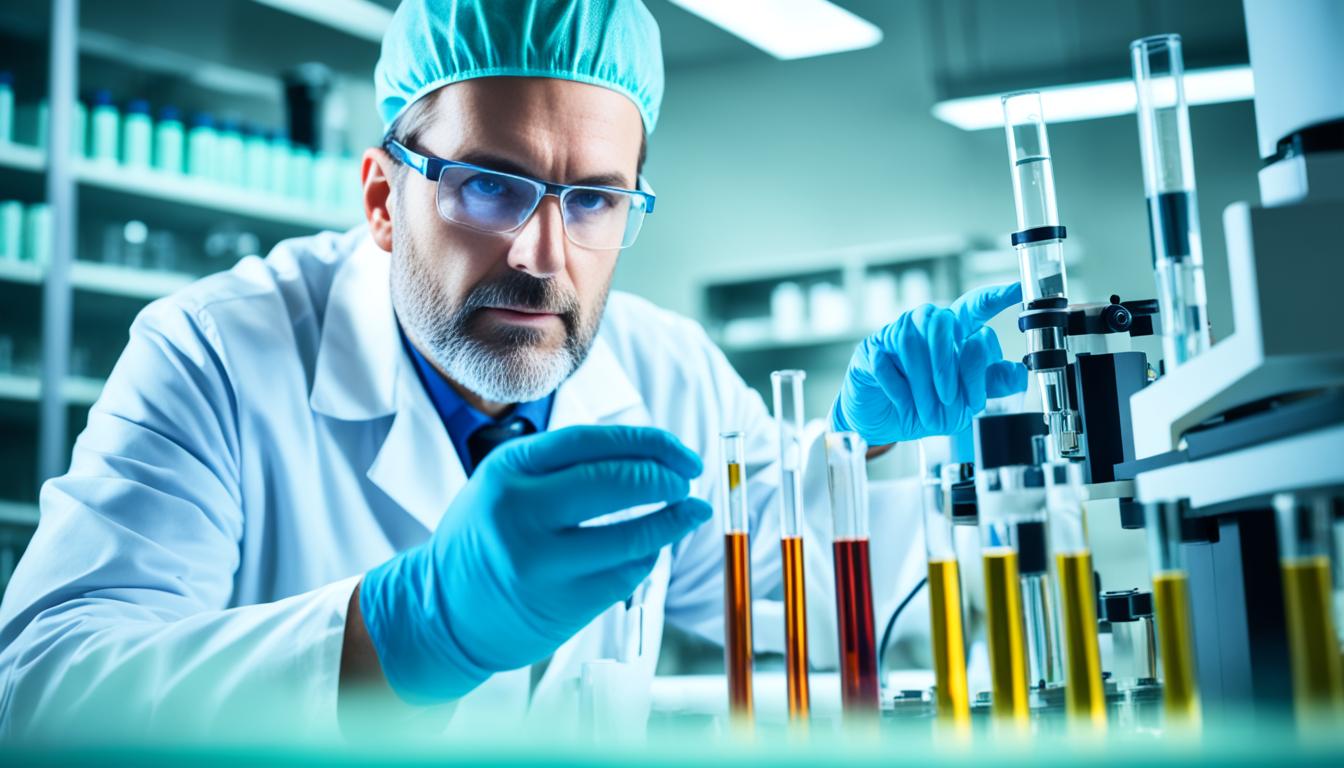Testosterone is key for masculinity in men. It shapes things like voice, hair, and strong bones. When levels are too low, men might face issues like poor energy, sadness, and a weak sex drive. This condition is called testosterone deficiency.
It is normal for testosterone to drop with age. Yet, it can also happen because of health issues, genes, or some drugs. Lifestyle choices such as being overweight or drinking too much can also play a role. To find out if testosterone is lacking, doctors run tests on hormone levels and look for other health concerns.
There are ways to tackle low testosterone. One common approach is with testosterone gel or shots. But, improving diet, shedding extra pounds, and working out can also be big helps. For some, especially those looking for innovative care, stem cell therapy in Thailand might be worth considering.
Key Takeaways:
- Low testosterone, or testosterone deficiency, is a common issue in men. It can lead to tiredness and a lower interest in sex.
- Health problems, genes, medications, and certain ways of living can lower testosterone.
- To find if testosterone is lacking, tests on hormone levels and other health checks are needed.
- There are different ways to address low testosterone, including using testosterone, losing weight, and stem cell therapy.
- Stem cell therapy from Thailand is an exciting option being explored for low testosterone.
Causes and Risk Factors of Testosterone Deficiency
Testosterone deficiency, also known as low T or hypogonadism, happens due to many reasons. It can be from medical issues, genes, lifestyle choices, or some drugs. Knowing what causes and risks lead to low testosterone is key to getting the right help.
Medical Conditions
Various health issues can lower testosterone. These include:
- Autoimmune diseases
- Chronic liver or kidney disease
- Chronic obstructive lung disease
- Heart failure
- HIV or AIDS
- Infections
- Injury to the testicles
- Metabolic disorders
- Obesity
- Tumors in the pituitary gland
- Testicular cancer or its treatment
- Type 2 diabetes
It’s key to realize that often, a mix of issues causes low testosterone in men.
Medications
Some drugs can also lower testosterone production. These medications include:
- Alcohol
- Chemotherapy drugs
- Corticosteroids
- Opioids
This can happen because these drugs mess with how your hormones are made. And that can lead to not enough testosterone.
Age
Getting older is a main cause of lower testosterone. After about 30, testosterone levels drop by 1 percent each year.
Figuring out what’s causing low testosterone is crucial. With a detailed check by a doctor, the real reasons for the low levels can be found. This is the first step to treating it right.
| Causes/Risk Factors | Description |
|---|---|
| Medical Conditions | Autoimmune diseases, chronic liver or kidney disease, chronic obstructive lung disease, heart failure, HIV or AIDS, infections, injury to the testicles, metabolic disorders, obesity, tumors in the pituitary gland, testicular cancer or its treatment, and type 2 diabetes. |
| Medications | Alcohol, chemotherapy drugs, corticosteroids, opioids. |
| Age | Natural decline in testosterone levels starting around the age of 30, with a gradual decrease of about 1 percent per year. |
Diagnosis and Treatment Options for Testosterone Deficiency
To find out if someone has low testosterone, doctors run tests. These tests check hormone levels like total testosterone and LH. Other tests, such as bone density checks and MRI scans, look for what might cause the low levels.
The main way to treat low testosterone is through TRT. It’s often used to help men with sexual issues. But, TRT can lead to problems like sleep apnea or acne.
There are also natural ways to boost testosterone. Changing your lifestyle can help. For example, losing weight, drinking less alcohol, and managing stress. Getting enough sleep, exercising, and eating well also make a difference. In Thailand, stem cell therapy is becoming a new option. This treatment uses stem cells to help the body make more testosterone.
Many tests and treatments can help people with low testosterone. They have different paths to try and feel better.

